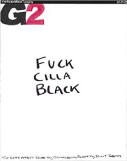
I write for American publications that do not, in general, permit profanity. This is painful because I tend to write about people for whom profanity is oxygen, and their curses convey a sense of who they are. Alas, rules are rules. A particularly genteel publication once air-brushed a line in which I quoted someone as saying, “I was not doing jack.” The deletion was required, my editor explained, because the quote implied a forbidden word.
British newspapers don’t mind the occasional oath. The Guardian, in a fine example of this, has run a controversial cover illustration for its tabloid section, known as G2. Designed by Gillian Wearing, a cutting-edge artist, the cover consists of three words: “Fuck Cilla Black.” A large number of readers complained because “Fuck” was printed so prominently (the word appears, on average, twice a day in the paper, in smaller print), and because it was directed at a warm television personality who, among the many celebrities whose names might deservedly be preceded by an unlovely assemblage of four letters, would be the least deserving.
Ian Katz, the features editor of The Guardian, wrote an entertaining story today about the affair. He notes that among the stream of complaints, “A number of readers who took the time to find out which editor had taken the decision to run the Wearing cover proffered a succinct comment: Fuck Ian Katz.” The cover story revolved around two events: the screening of a coarse reality show, “Without Prejudice,” and Cilla Black’s resignation from “Blind Date,” a tame show. As Katz writes, “The idea for our cover story began to crystallise: nastiness was the new fashion on British TV and Cilla simply wasn’t nasty enough to cut it on the new Mean TV.” The cover was intended to convey “the voice of Mean TV passing judgment on a cuddly matriarch from another age of television.”
Katz doesn’t buy the argument that young children might be corrupted by The Guardian’s standards. “Any parent knows that almost any child over the age of six will be exposed daily to (and will almost certainly be using) language that would make Wearing sound like a country vicar…We regularly feature images on our pages every bit as shocking as any language used in the paper. In recent months we have published photographs, sometimes on the front page of the newspaper, of burned bodies in Kenya, a dead Taliban soldier close up, countless dead or dying victims on both sides of the Middle Eastern conflict and bodies being dragged from the aftermath of the Moscow theatre siege. If, as parents, we think this is suitable material for our children, does it make sense to say judiciuous use of bad language is not?”
True, but creative gentility has its uses. Last year I wrote a story about an Afghan warlord, Gul Agha, whose favorite word is “motherfucker.” My editor suggested a series of wonderful alterations that made the published quotes more humorous without the curses. The following passages involve a luncheon at which I sat next to Gul Agha:
A man walks up, looking for a spot on the floor. Gul Agha eyes him and says, “Take off your shoes,” and addresses him with an insult to him and his mother. The shoes vanish in a split-second shuffle, and everyone laughs, including Gul Agha, who uses profanity as a way of saying hello. With his audience assembled and warmed up, it is time to talk about his favorite subject: war.
“When the enemy attacks,” Gul Agha begins, “I fight them face to face. I do not hide behind my soldiers. When I came into the Kandahar airport, we were in four cars, and I was in the first car. The Arabs came at us. I told my soldiers that anyone who runs is a [see insult above]. I took out my Kalashnikov and killed three Arabs. When my soldiers saw that I killed three Arabs, they were encouraged and jumped from their cars and ran at the Arabs. We killed 18 Arabs at the gate of the airport.”
…Gul Agha is ready to tell another story. “Mullah Omar said, ‘I want to fight Gul Agha once because I have heard about him a lot, and I want to see if he is a good fighter.’ I said, ‘I will give you a knife, and I will have a knife, and we will be alone, face to face, and we’ll see which [that expletive, again] will shout first” — and once more, the insult involving one’s mother.

